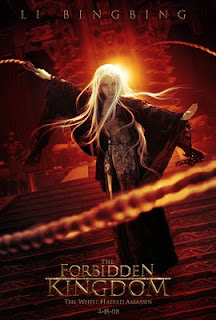
This story starts off in South Boston, where awkward teen Jason Tripitkas (Michael Angarano) loves kung-fu movies, has no luck with the local girls, and gets bullied by some one-dimensional teenage thugs. After a botched robbery and quick chase at Jason's favorite store, he finds himself transported back to ancient China, holding the mysterious staff from that store.
In short order Jason meets Lu Yan (Jackie Chan), a traveling martial artist and heavy drinker; he also claims to be one of the legendary immortals. Lu provides the story behind the staff. At a gathering of immortals, the mischievous Monkey King (played by Jet Li) was tricked and betrayed by the Jade Warlord (Collin Chou), who turned the Monkey King to stone. Before being petrified, the Monkey King sent the staff away, and legends say when it is returned by a seeker the Monkey King will be free.

Jason also meets up with the Silent Monk (also played by Jet Li) who, after fighting with Lu, decides to join them. Rounding out the makeshift party of heroes is Sparrow (Liu Yifei), a beautiful young woman and skilled warrior whose family and village were slaughtered by the troops of the Jade Warlord. She has a weapon which can slay an immortal, and she seeks revenge on the Jade Warlord.
The villains aren't as diverse as the heroes. The Jade Warlord is a ruthless leader, skilled and fighting and ruthless in command. There's a deadly assassin named Ni Chang (Li Bingbing), a white-haired killer who is equally skilled with a whip, a bow, or her enchanted hair. Otherwise, the bad guys have hordes of heavily armored sword-wielding troops who know enough martial arts to fight the heroes but not enough to do anything but get their butts handed to them every time.
 The Forbidden Kingdom is enjoyable fluff. The fight scenes are impressive, and it's nice to see Jackie Chan reprising his drunken master style of fighting again. Even though the action uses as much special effects and wire tricks as combat, Chan and Li still manage to put on a great show of martial arts. (The other actors are no slouches either.) The story is as much comedy as excitement, and there are no surprises along the journey: We know who's going to find themselves, who's doomed, and what will happen in the end. The Forbidden Kingdom is a good diversion, a movie that's an entertaining way to spend an afternoon.
The Forbidden Kingdom is enjoyable fluff. The fight scenes are impressive, and it's nice to see Jackie Chan reprising his drunken master style of fighting again. Even though the action uses as much special effects and wire tricks as combat, Chan and Li still manage to put on a great show of martial arts. (The other actors are no slouches either.) The story is as much comedy as excitement, and there are no surprises along the journey: We know who's going to find themselves, who's doomed, and what will happen in the end. The Forbidden Kingdom is a good diversion, a movie that's an entertaining way to spend an afternoon.Overall Grade: B
Reviewed by James Lynch



















































